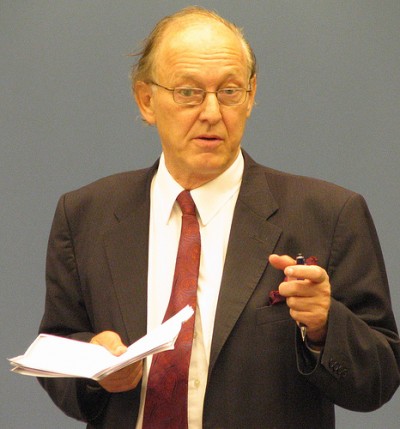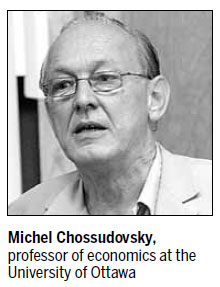America and Europe in Crisis. “China is the World’s Largest Economy”

First published in December 2012
by Zheng Yangpeng
Too many businesses in China are still reluctant to give up their reliance on exports, despite the government’s calls for a more domestic-driven economy.
That’s according to Michel Chossudovsky, a professor in economics at the University of Ottawa, who also thinks that owing to its huge production base and to slowing economies elsewhere, the country is already the world’s biggest economy.
In an interview with China Daily, Chossudovsky said much has been written about how the bleak economic conditions in Europe and the US have provided an impetus for China to shift from export-driven toward domestic-driven growth.
But he said the more underlying reason is that China’s trade with the West remains unfairly priced, and “unequal”.
To re-balance that, and to encourage the shift in economic priority away from exports, he suggested that the Chinese government increase the purchasing power of its population by raising wages by at least 10 percent.
He also said that more effort should be given to negotiating what he would consider to be fairer factory prices in the country, and elsewhere in Asia, compared with the West.
The author of many books on globalization, Chossudovsky said the current political rhetoric in the US is that China is “stealing” US jobs.

“But that’s just not true,” he said. “China is not stealing jobs. It is US business that’s losing jobs.
“The industrial base of the US is declining because factories from California to Connecticut are closing down, and business people are now choosing to subcontract those jobs to China,” he said.
“If you look at the Western economies, especially the US, they are very fragile.
“They are highly dependent on China, to an extent that people there don’t realize,” said the much-traveled professor.
In recent months, various economic and commercial organizations have predicted when China will become the world’s largest economy.
This week, for instance, the US Intelligence Council said in a report that it expected China will “probably have the largest economy in the world, surpassing that of the US, a few years before 2030”.
Earlier this year, the OECD and IMF both suggested that would be 2016, while global banking groups Citigroup Inc and HSBC Group have suggested it will happen 2020-2022.
But Chossudovsky thinks that given the size of its massive production base, China is already the world’s largest economy, as countries in the West continue to struggle.
But he insists that based on his international research and experience, it is obvious that China’s trade with the West is, in essence, “unequal”.
During his previous trip to the country, he met import and export companies, which said they constantly had to negotiate with Western buyers on price, despite already working on very low profit margins.
Even with factory prices at their absolute minimum, and sourcing goods from around the world, back on Western streets, customers – and particularly those in the United States – were still having to pay top prices for consumer goods because of the huge markups needed to pay off the various others in the chain, including retailers, wholesalers, distributors, and shopping mall owners.
Yet, despite gaining often tiny percentages from their factory goods, China, and other export-oriented Asian economies, have still managed to enjoy huge industrial development through exports, making the success all the more impressive, he noted.
Chossudovsky added that the role China has performed since the beginning of its modernization has created an industrial base, which is now increasingly diversified.
But in terms of industrial production, China is still playing a “dependent” and “peripheral” role in the global economic hierarchy, with its export economy serving the interests of developed economies, rather than its own.
For many businesses in the country, giving up their role of exporter to the world is proving hard, he said.
“There are certain perks attached to the export sector, and I feel that in China right now, the export market is (still) preferred,” he said.
A lot of that, he added, is due to a failure so far to offer an alternative, and with wages still low, reliance on replacement domestic business can’t be guaranteed.
“You have to make sure that your companies can make money in the domestic market as well as foreign markets, so you shouldn’t create an environment which favors one over the other.”
Chossudovsky said it is essential for China to boost its internal demand by increasing people’s purchasing power.
“For example, a 10 percent increase in wages would substantially boost domestic demand without making Chinese enterprises less competitive internationally.”
He said that negotiating factory prices is another priority for China.
A better price means you may export less, but get more revenue. As a result, Chinese enterprises will move into more specialized, more high-tech and highly skilled areas, he added.
If the country can act on those three key issues, China’s new leaders will be able to illustrate how the country is working relentlessly at pointing itself in a different direction, he said.
“I think it is important for the West to understand it is dependent on China.
“And China should make it known that it does not rely on the West as much, as it has its own tremendous internal market,” Chossudovsky said.

